A CareerBuilder survey says that bosses think they lose 2-3 hours a day. This is because employees get distracted a lot. This lost time means less money and profit.
We must find and fix the biggest time wasters. This helps keep up our work, quality, and client happiness. It also keeps the team spirit high and earnings steady. This piece talks about work distractions and how to deal with them. By managing time well and avoiding distractions, everyone can work better together. This makes the workflow smooth and fast.
Smartphone Distractions
In today’s world, too much smartphone use is a big problem at work. A CareerBuilder survey found that 66% of workers use their phones a lot during work. This can make them lose focus and waste time.
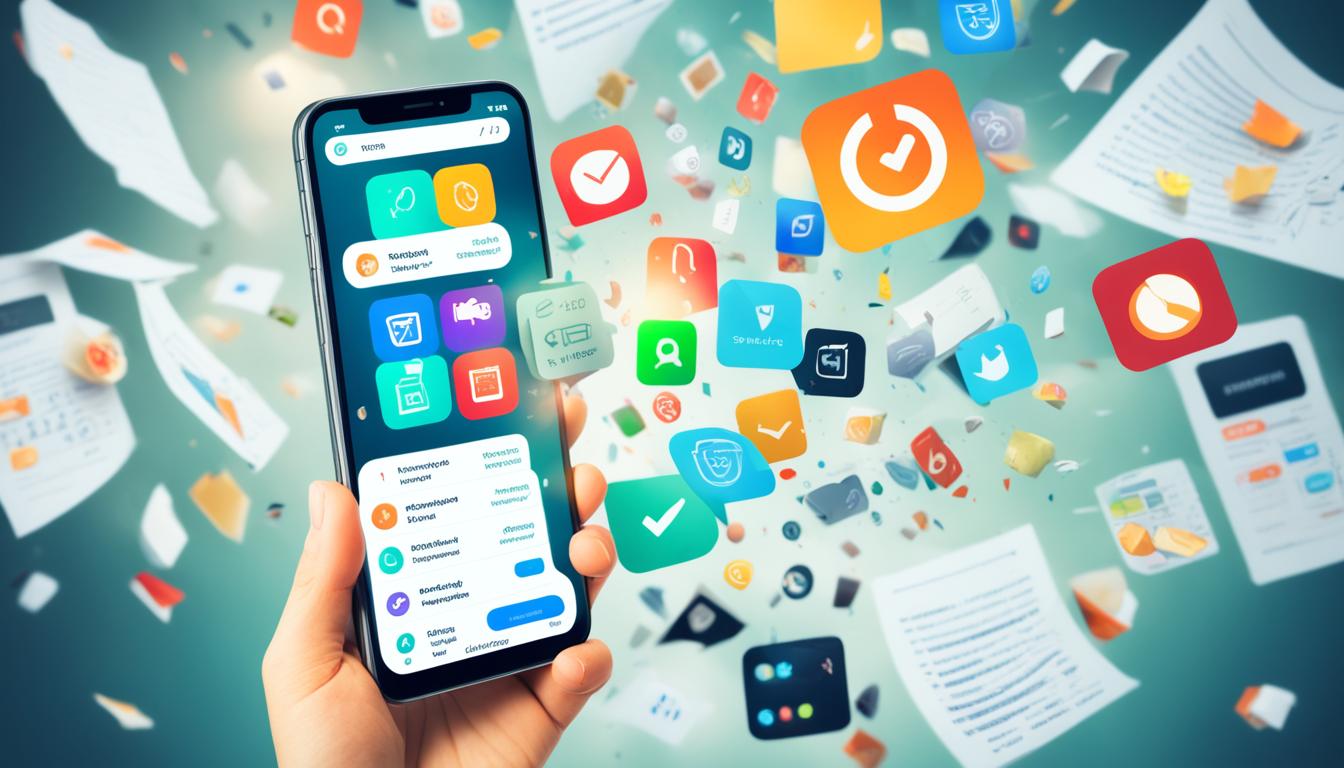
How Smartphones Hinder Productivity
People often spend three hours a day on their phones. Some even use them for 4.5 hours or more. Workers get interrupted every 11 minutes, making it hard to focus again. They end up switching tasks over 300 times a day. This causes a loss of almost eight work hours every week.
Strategies to Minimize Smartphone Usage
To improve work focus, limiting phone use is key. It’s good to check your phone only at certain times. Productivity apps can also help stay on track. Turning off personal notifications at work is a good idea.
Offering time management workshops can help, too. Workplaces should have quiet areas and flexible schedules. This can make people less dependent on their phones.
Email Overload
Email overload can really slow us down at work, making us always want to check our messages. About 68% of workers say emails distract them the most at work. This leads to less work done and not being able to focus well.
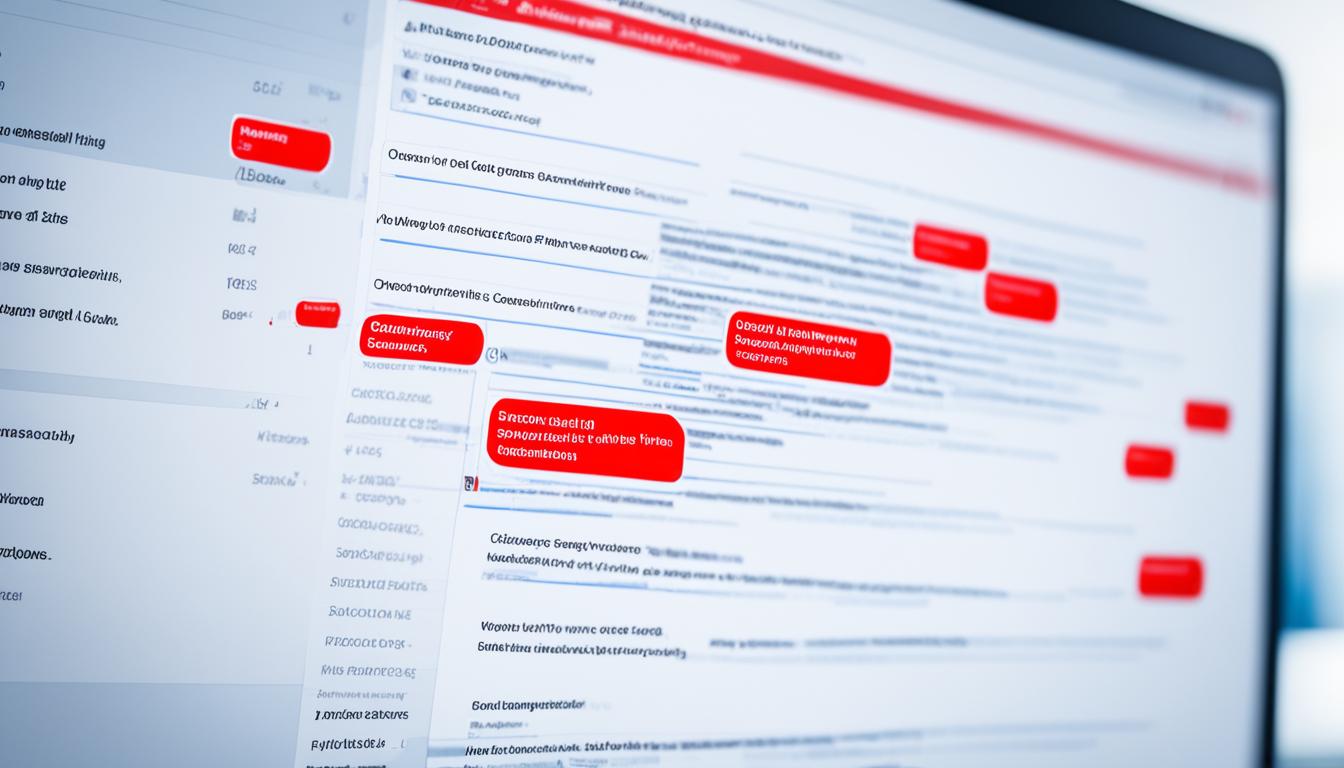
Impact of Constant Email Checking
Worrying about missing important emails, many of us check our inbox all day. This hurts our ability to do hard tasks well. The American Psychological Association says switching tasks often lowers productivity. Also, companies lose about $1.7 million a year for every 100 workers because of too much email checking.
To fight this, try turning off your email notifications and only look at emails at set times. This method keeps you focused. By checking emails for just 30 minutes daily, you can have more time for important work.
Effective Email Management Techniques
Using tools like Asana to organize emails or setting specific times to check emails can make a big difference. It also helps to check emails later in the day. This way, your mornings are more productive.
Having ready-to-go answers for usual emails and clearing your inbox quickly helps too. If an email takes less than two minutes to answer, do it right away. Teaching others to expect slower replies and timing your email work can stop you from switching tasks too much.
Social Media Usage
Social media platforms are great for networking but can distract us often. On average, people get interrupted every three minutes. This can harm their digital wellbeing and their work’s quality.
One way to stay focused is to check social media at set times. This can keep you productive. Sadly, 89% of workers admit they get sidetracked at work, says a study.
Apps that block social media can help you stay on task. For instance, Retain Social by Micro Focus tracks how much you use these sites. It helps workers refocus faster after getting distracted.
Google, Facebook, and LinkedIn are big distractions at work. Employing clever strategies to reduce social media time is crucial. Just 10 minutes on these sites each day equals 43 lost work hours a year. A smart plan for social media can boost productivity and protect digital wellbeing.
Frequent Snacking
Many employees snack throughout their workday. This habit can greatly affect focus and productivity. An entry-level administrative assistant might spend up to four hours a day eating, which hurts her work output.
Snacking in the morning, during long lunch breaks, or late afternoon cuts productive hours. It also distracts colleagues in the same space.

How Excessive Snacking Affects Focus
Too much snacking can break healthy eating habits and lead to less productive time. For example, it leaves the administrative assistant with only 3-4 hours of effective work a day. Her constant eating and phone use also distract her coworkers.
About 65% of employees feel such habits, including frequent snacking, reduce their work efficiency. A good diet and proper eating routines can make them focus more on work than on food.
Creating a Structured Eating Schedule
A structured diet improves focus and productivity at work. By setting specific times and places for eating, employees can keep a steady attention span during work. Using productivity software to track eating habits helps avoid distractions.
Encouraging healthy eating with set meal times keeps snacking from disrupting work. This method boosts personal performance and inspires the whole team.
Disruptive Coworkers
About 24% of people say chatting at work is their top distraction, according to research. In busy offices, coworkers can make it hard to stay focused, cutting productivity by up to 66%. One good idea is to have ‘office hours’ for talking to colleagues.
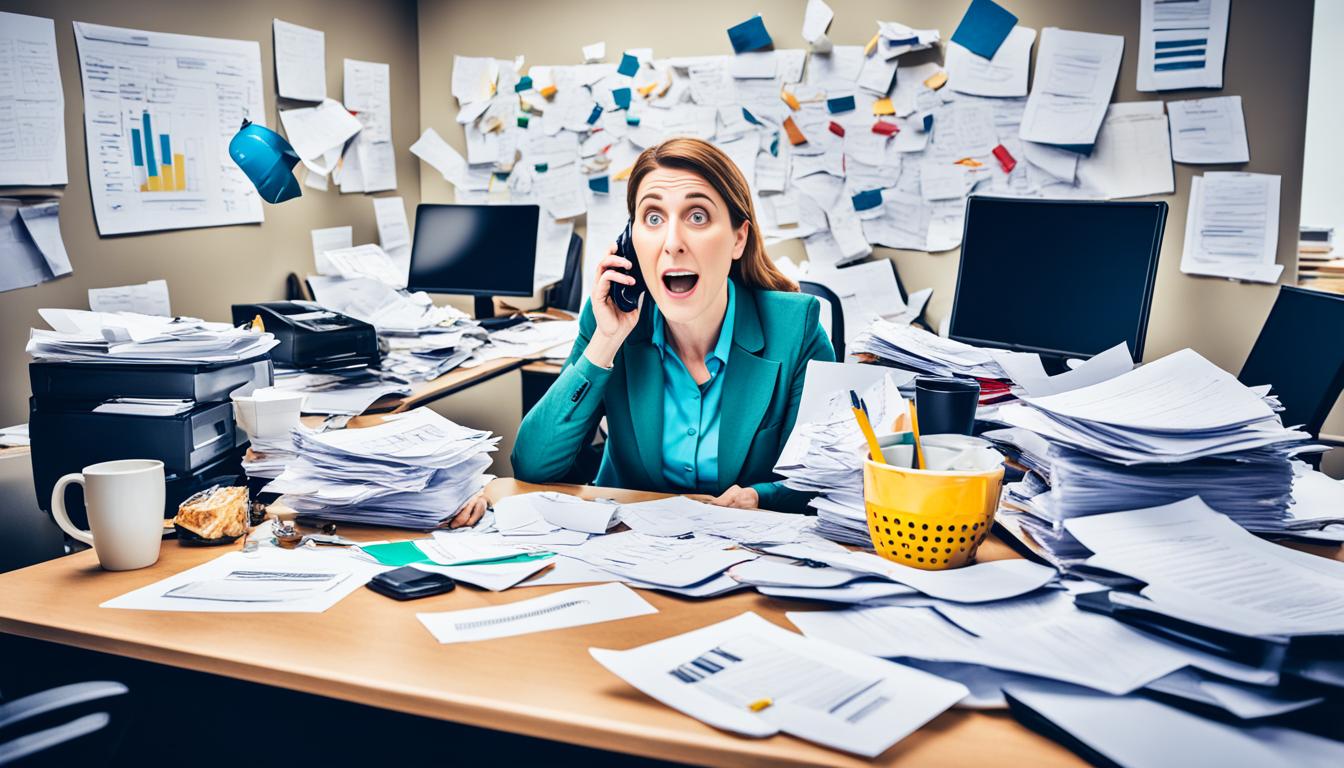
Having fixed times for group work can help balance and boost productivity. Remote work shows us that tools can help manage teams in different places. Likewise, setting rules in the office can make things run smoother. Also, celebrating team wins is key for staying motivated and productive.
Unplanned emails and random online chats add to workplace distractions. Americans often check their email 36 times in an hour. Having set times to check emails and talk about non-critical stuff can make a big difference.
Using time management tools can also help. Blocking sites like social media during work hours cuts down on distractions, say studies on distractions at work. Managing disruptions well means not losing 23 minutes each time we get sidetracked.
Time Wasters at Work
Activities that waste time at work can really hurt efficiency. People at work might waste from 30 minutes to over 3 hours daily, says a survey by GetVoip. Taking steps to cut down on these can boost focus and work speed.
Common Office Time Wasters
Offices have lots of distractions. Office workers get interrupted about every 11 minutes. This hurts their work a lot. Emails, messy desks, calls, and chats with others at work are big time-wasters. A study shows that 86% of workers talk about rumors at work, which is bad for efficiency.
Millennials might waste about 2 hours each day. This leads to about $1316 lost every month for each worker, based on a $32.92 hourly wage from the US Bureau of Labor Statistics. This loss adds up, making work much less productive.
Setting Boundaries with Colleagues
It’s important to have clear rules to manage disruptions. Deciding on specific times for deep, focused work can help a lot. Letting your colleagues know these rules can build respect for focused times.
Using software to track time and monitor work can show where time goes. It helps find and fix inefficiencies. Setting times for checking emails can also cut down on distractions, helping everyone work better.
Using software for managing tasks, like Profit.co, helps organize work and boost teamwork. This makes sure important tasks get attention first. Also, making repetitive tasks automatic saves time. Clear talks and set rules can stop unwanted interruptions, leading to better work productivity.
Disorganization
Disorganization at work can really slow things down. It doesn’t matter if it’s messy desks, confused digital files, or just being scatterbrained. All of these lead to wasting lots of time. A cluttered desk makes it hard to work well. It’s tough to find important stuff. This means deadlines might be missed. And that makes everyone waste time looking for things they need.
Making things digital can really help tidy up. Using cloud tools helps find documents fast and cuts down on mess. If you organize emails and files well, you won’t lose important things. This makes everything run smoother.
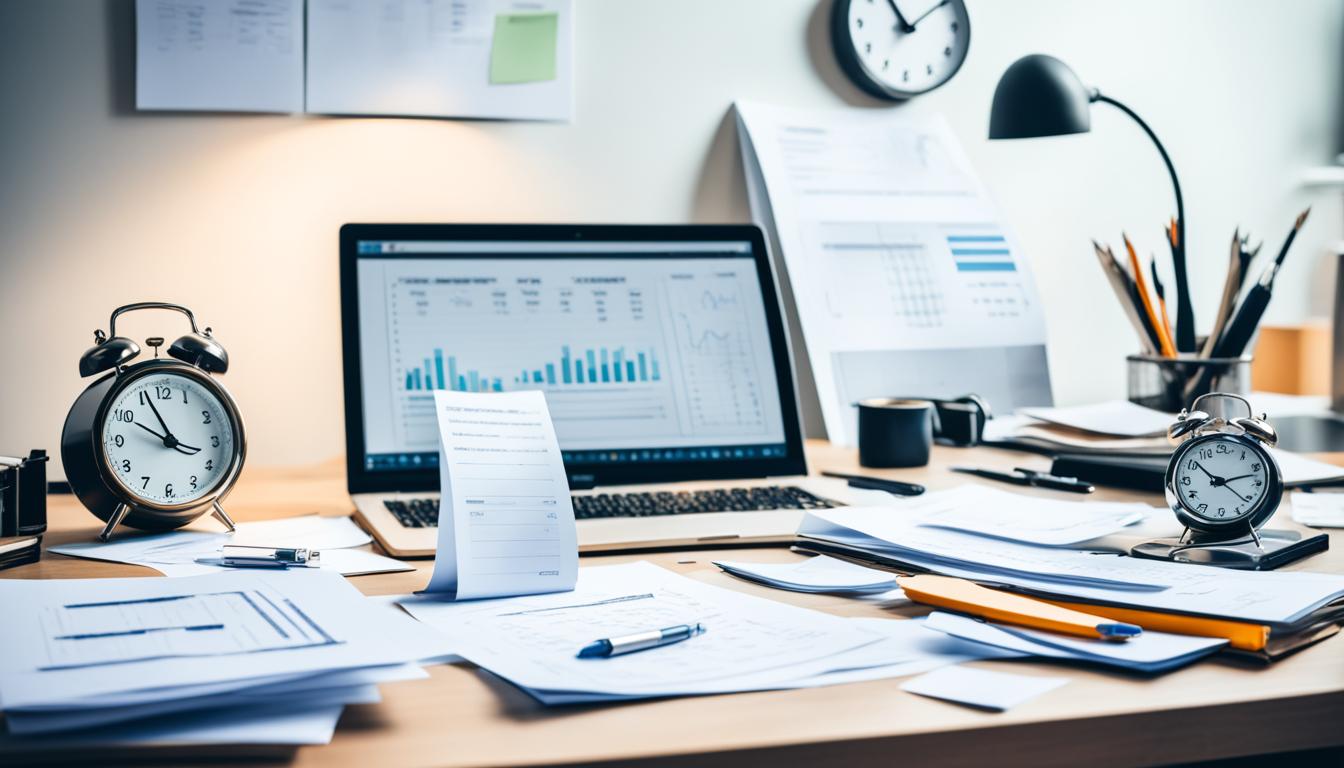
More than half of workers say messy meetings with no clear plan waste time. They believe this chaos lowers how much work gets done. Having a good organization plan saves time and boosts work efficiency. It shows that keeping things in order is key for doing well and succeeding at work.
Unproductive Meetings
Meetings are eating up a lot of time in companies. Executives now spend about 23 hours a week in them. This is a huge jump from less than 10 hours back in the 1960s. A Harvard Business Review article from July-August 2017 says bad meetings can hurt innovation and profits.
Characteristics of Ineffective Meetings
Bad meetings often don’t have clear goals. They include people who don’t need to be there. This leads to time waste and poor decisions. About 67% of workers say bad meetings kill their productivity. And 92% do other things in meetings, hurting focus and communication.
Very few, just 2.5%, are good at doing many things at once. So, it’s clear why meetings don’t go well. Meetings that aren’t useful are a top way time gets wasted at work. Read more about this on Forbes.
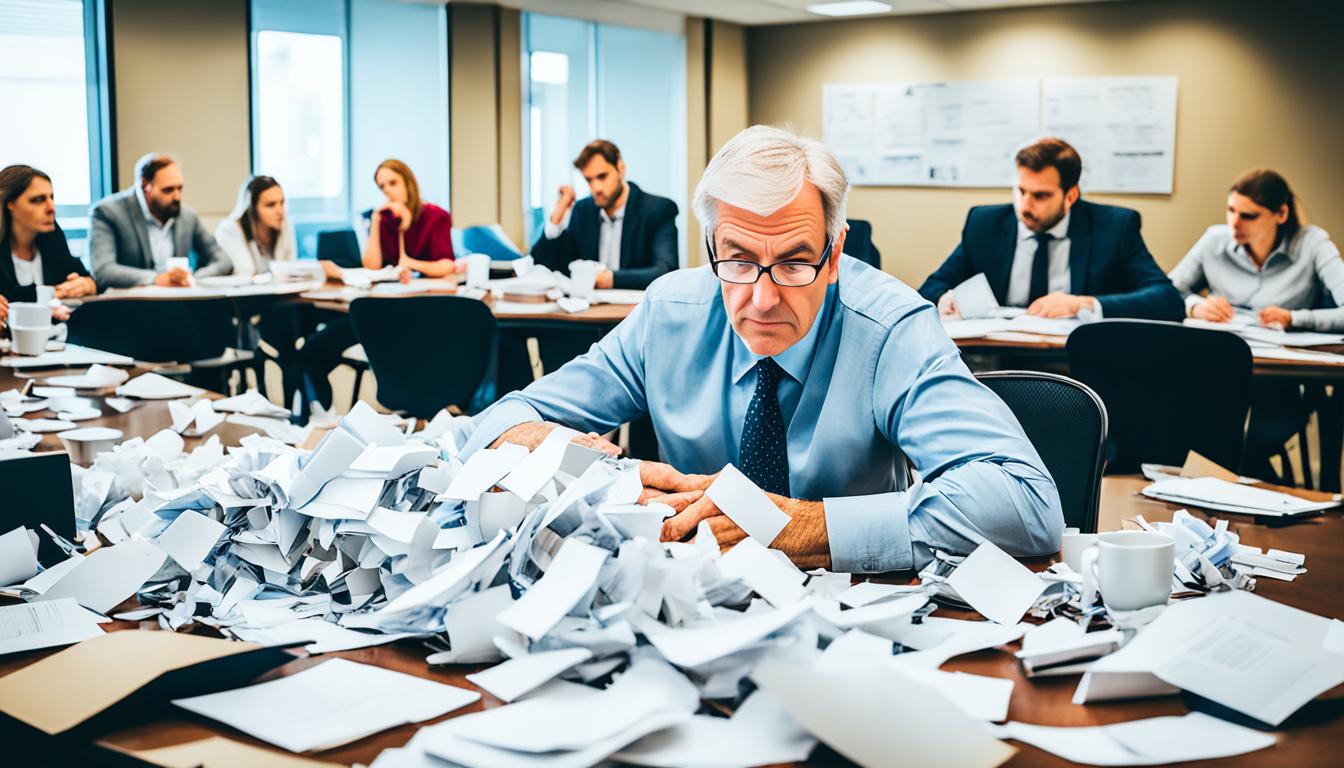
Tips for Running Efficient Meetings
To make meetings better, plan well. Make sure each meeting has a specific purpose. Make an agenda before the meeting and share it. This keeps the meeting on topic.
Keep meetings short to keep attention. Have only the needed people there. End with clear next steps to get things done. Asking employees to do just one thing at a time in meetings helps too.
Studies say about 31% of workers waste 30 minutes a day on distractions. This includes useless meetings and too much email. By managing meetings well, you’ll get more done. This improves communication and decision-making in your company.
Multitasking Pitfalls
Multitasking is often seen as good for work, but it’s not. It can cut productivity by up to 40%. We get distracted easily and make more mistakes when we try to do too much at once. This slows us down and increases the chance of errors.
The Myth of Multitasking
Multitasking doesn’t make us more productive. In fact, it makes our work suffer. We’re better at focusing on one thing at a time. A study shared by Health Magazine in 2013 found those who multitask often do worse. Jumping from task to task also takes longer and leads to more errors.
Focusing on One Task at a Time
Focusing on one thing at a time can make us more productive. Setting aside time for each task improves our focus and reduces mistakes. It also lowers stress and helps us ignore things that aren’t important. By doing one thing at a time, we can work better and get more done.
Conclusion
Beating time wasters is key for better work productivity and efficiency. This article shows how big a deal office distractions are. They really affect how much work gets done and how happy employees feel. Knowing about these problems is the start of fixing them.
DeskTrack software helps track time and work, making it easier to get things done. It’s good to set boundaries, have fewer meetings, and manage emails well. We learned that pointless tasks take up 31% of the workday. Also, too many meetings slow down about 67% of workers. With these facts, we can find ways to make things better.
Awareness of distractions like talkative coworkers, loud offices, and social media is crucial. Employees can then work on making a more focused space. Using good time management lets us beat time wasters. This makes work more efficient and the workplace happier.
FAQ
How significant is the impact of productivity loss due to distractions?
A CareerBuilder survey found that 75% of lost productivity may be due to distractions. Employers see two to three hours wasted daily. This results in lost revenue and profit, showing the need to tackle distractions.
How do smartphones hinder productivity?
According to CareerBuilder, 66% of workers use their phones often during work. This leads to lost work time, as hours go to non-work activities on their phones.
What strategies can minimize smartphone usage during work hours?
To reduce smartphone distractions, try silencing your phone or keeping it out of sight. Set specific times to check your phone. Use apps that block distractions and manage time well.
What is the impact of constant email checking on productivity?
Checking emails too often can hurt productivity. It causes interruptions and makes it hard to focus.
What are effective email management techniques?
For better email management, turn off notifications and set times to read emails. Use tools to help manage your time and emails better.
How does social media usage affect workplace productivity?
Social media can take attention from work, hurting productivity. Notifications and the appeal of platforms cause distractions.
How does excessive snacking affect work focus?
Snacking too often can break your concentration and slow your work. It often fills time when we’re not really hungry.
How can one create a structured eating schedule to boost productivity?
Following a set eating schedule helps avoid disruptions. Use applications to track snacking habits. Having definite times and places to eat improves focus.
How do disruptive coworkers impact productivity?
Coworkers can disrupt work by interrupting or asking for help too much. This breaks focus and lowers efficiency.
What are common office time wasters?
Interruptions, phone calls, emails, and being disorganized waste lots of time. These distractions reduce how much work gets done.
How can setting boundaries with colleagues improve productivity?
Setting ‘office hours’ for discussions helps balance teamwork and solo work. Clear boundaries protect focused work time from interruptions.
How does disorganization contribute to time wastage?
Being disorganized in any area can waste much time. Without a system, finding resources or getting ready to work takes longer.
What are the characteristics of ineffective meetings?
Ineffective meetings lack clear objectives, have too many people, or go on too long. Such meetings are a waste of time.
What tips can help run efficient meetings?
To have productive meetings, plan them with a clear agenda. Limit how long they last and who needs to be there. Finish with specific next steps.
Is multitasking beneficial for productivity?
Despite common belief, multitasking usually reduces productivity and increases mistakes. It’s better to focus on one thing at a time for better results.
How does focusing on one task at a time improve productivity?
Focusing on one task at a time improves work quality and efficiency. This approach reduces the stress of juggling tasks.

More Posts
11 Lessons from 'Atomic Habits' to Overcome Procrastination
Procrastination is a common problem that can lower our productivity and happiness. It's important to understand this habit and use good [habit formation](https://jamesclear.com/procrastination) strategies. James Clear’s 'Atomic Habits' shows us how to beat procrastination by...
Manage OCD And Procrastination- Effective Mental Health Tips
Many people with OCD put off everyday tasks due to tough feelings, anxiety, and sometimes obsessive thoughts that make even specific tasks feel overwhelming. For people with obsessive-compulsive disorder, both internal and external...
9 Monthly Planning Mistakes to Avoid
It's key to have good financial planning for your future and to stay stable. But many make mistakes in their monthly plans. A good plan needs clear goals and review to fit new...
Increasing Dopamine Naturally - 10 Useful Tips
The concept of our happiness mostly depends on dopamine since it directly affects the pleasure and reward centers of the brain. It is correlated with satisfaction, motivation, appetite, sleep, libido, memory and many...